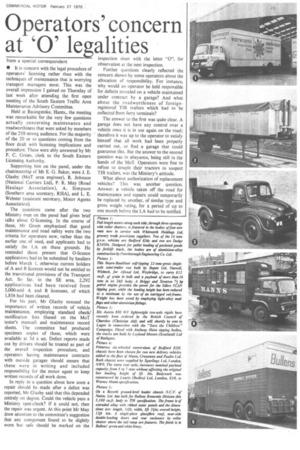Operators' concern at '0' legalities
Page 27

If you've noticed an error in this article please click here to report it so we can fix it.
from a special correspondent • It is concern with the legal procedure of operators' licensing rather than with the techniques of maintenance that is worrying transport managers most. This was the overall impression I gained on Thursday of last week after attending the first open meeting of the South Eastern Traffic Area Maintenance Advisory Committee.
Held at Basingstoke, Hants., the meeting was remarkable for the very few questions actually concerning maintenance and roadworthiness that were asked by members of the 250-strong audience. For the majority of the 20 or so questions coming from the floor dealt with licensing implications and procedure. These were ably answered by Mr P. C. Green, clerk to the South Eastern Licensing Authority.
Supporting him on the panel, under the chairmanship of Mr E. G. Baker, were J. E. Glasby (MoT area engineer), R. Johnson (National Carriers Ltd), P. R. May (Road Haulage Association), A. Simpson (Southern area secretary, RHA), and L. E. Webster (assistant secretary, Motor Agents Association).
The questions came after the two Ministry men on the panel had given brief talks about 0-licensing. In the course of these, Mr Green emphasized that good maintenance and road safety were the two criteria for operators now, rather than the earlier one of need, and applicants had to satisfy the LA on these grounds. He reminded those present that 0-licence applications had to be submitted by hauliers before March 1, otherwise current holders of A and B licences would not be entitled to the transitional provisions of the Transport Act. So far. in the SE area, 2,292 applications had been received from 3,000-odd A and B licensees, of which 1,856 had been cleared.
For his part. Mr Glasby stressed the importance of written records of vehicle maintenance, employing standard check/ rectification lists (based on the MoT tester's manual) and maintenance record sheets. The committee had produced specimen copies of these, which were available at 3d a set. Defect reports made out by drivers should be treated as part of the overall inspection procedure, and operators having maintenance contracts with outside garages should ensure that these were in writing and included responsibility for the motor agent to keep written records of all work done.
In reply to a question about how soon a repair should be made after a defect was reported, Mr Glasby said that this depended entirely on degree. Could the vehicle pass a Ministry spot-check? If it could not, then the repair was urgent. At this point Mr May drew attention to the committee's suggestion that any component found to be slightly worn but safe should be marked on the
inspection sheet with the letter "0", for observation at the next inspection.
Further questions clearly reflected the concern shown by some operators about the allocation of responsibility. For instance, why would an operator be held responsible for defects revealed on a vehicle maintained under contract by a garage? And what about the roadworthiness of foreignregistered TIR trailers which had to be collected from ferry terminals?
The answer to the first was quite clear. A garage does not have any control over a vehicle once it is in use again on the road; therefore it was up to the operator to satisfy himself that all work had been properly carried out, or find a garage that could guarantee this. But the answer to the second question was in abeyance, being still in the hands of the WT. Operators were free to refuse to couple their tractors to suspect Tilt trailers, was the Ministry's attitude.
What about authorization of replacement vehicles? This was another question. Answer: a vehicle taken off the road for maintenance and repairs could temporarily be replaced by another, of similar type and gross weight rating, for a period of up to one month before the LA had to be notified.




































































































